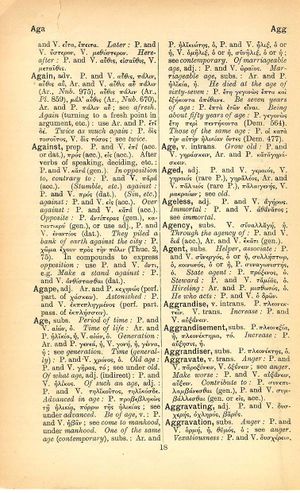age
τί δ' ἢν ῥαφανιδωθῇ πιθόμενός σοι τέφρᾳ τε τιλθῇ, ἕξει τινὰ γνώμην λέγειν τὸ μὴ εὐρύπρωκτος εἶναι; → What if he should have a radish shoved up his ass because he trusted you and then have hot ashes rip off his hair? What argument will he be able to offer to prevent himself from having a gaping-anus | but suppose he trusts in your advice and gets a radish rammed right up his arse, and his pubic hairs are burned with red-hot cinders. Will he have some reasoned argument to demonstrate he's not a loose-arsed bugger
English > Greek (Woodhouse)
subs.
Period of time: P. and V. αἰών, ὁ.
Time of life: Ar. and P. ἡλικία, ἡ, V. αἰών, ὁ.
Generation: Ar. and P. γενεά, ἡ, V. γονή, ἡ, γέννα, ἡ; see generation.
Time (generally): P. and V. χρόνος, ὁ.
Old age: P. and V. γῆρας, τό; see under old.
Of what age, adj. (indirect): P. and V. ἡλίκος.
Of such an age, adj.: P. and V. τηλικοῦτος, τηλικόσδε.
Advanced in age: P. προβεβληκὼς τῇ ἡλικίᾳ, πόρρω τῆς ἡλικίας; see under advanced.
Be of age, v.: P. and V. ἡβᾶν; see come to manhood, under manhood.
One of the same age (contemporary), subs.: Ar. and P. ἡλικιώτης, ὁ, P. and V. ἧλιξ, ὁ or ἡ, V. ὁμῆλιξ, ὁ or ἡ, συνῆλιξ, ὁ or ἡ; see contemporary.
Of marriageable age, adj.: P. and V. ὡραῖος.
Marriageable age, subs.: Ar. and P. ἡλικία, ἡ.
He died at the age of sixty-seven: P. ἔτη γεγονὼς ἕπτα καὶ ἐξήκοντα ἀπέθανε.
Be seven years of age: P. ἑπτὰ ἐτῶν εἶναι.
Being about fifty years of age: P. γεγονὼς ἔτη περὶ πεντήκοντα (Dem. 564).
Those of the same age: P. οἱ κατὰ τὴν αὐτὴν ἡλικίαν ὄντες (Dem. 477).
v. intrans.
Grow old: P. and V. γηράσκειν, Ar. and P. καταγηράσκειν.
Latin > English (Lewis & Short)
ăge: and ăgĕdum, v. ago, II. 12.

